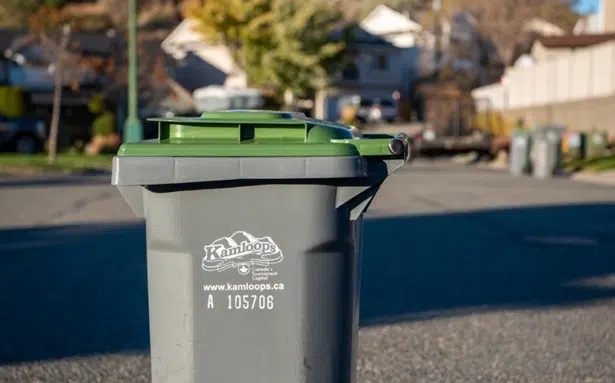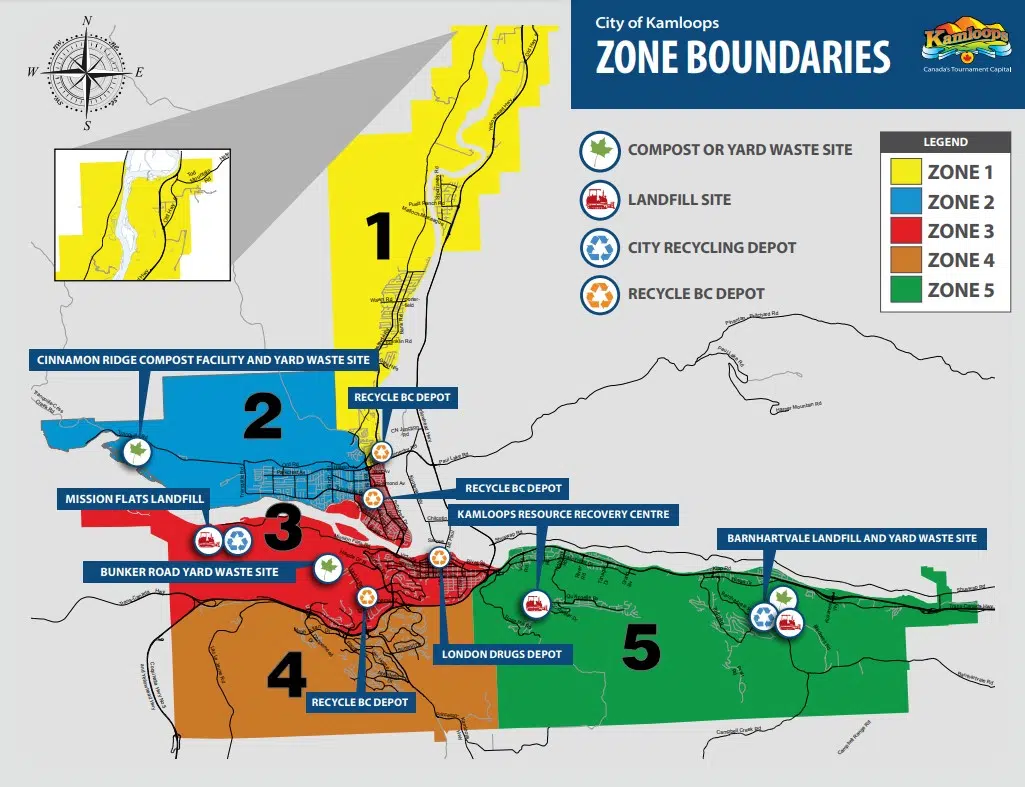
Photo via City of Kamloops
The City of Kamloops will begin the collecting things like food scraps, food-soiled paper, and small amounts of yard waste at the curb on Monday, August 21.
Streets and Environmental Services Manager, Glen Farrow, says the community-wide rollout of the curbside residential organics collection is the final step in a multi-year project that included research, public consultation, and a year-long pilot program in Juniper Ridge.
In Aug. 2022, the former City Council authorized the city-wide expansion of the pilot program, which will now cover around 27,000 homes across Kamloops.
“We’re very excited to finally introduce this program, which many other municipalities have had in place for years or decade,” Farrow said. “We know as a new program that it will require some adjustments from our residents with curbside collection.”
“However, the pilot program showed us that the majority of households can and did adjust well. We ask that residents hold off on any requests to upsize (or downsize) garbage or recycling carts until Nov. 1.”
Speaking on NL Newsday, Farrow said the program will not include apartments that have communal garbage or recycling bins.
“Townhouses, mobile home parks, detached homes, they are part of the program,” he said. “When we look at other developments where there is bin collection, so a dumpster, [they aren’t included as] this doesn’t include bin service.”
“The focus is cart collection but not to say that in the coming years, there won’t be an opportunity to expand that to the wider multi-family sector and commercial sector.”
Farrow says the program will divert over 5,800 tonnes of organic waste from the City’s landfills each year, while also reducing greenhouse gas emissions by nearly 9,500 tonnes per year, the equivalent to removing 2,000 passenger vehicles from the road for one year.
“We have seen a lot of buy-in and a lot of success, even from people who were already doing the right thing and composting as it was,” Farrow added. “Just the convenience of putting it in a cart and having it leaving your property immediately was a huge benefit.”
The City says the program will cost residents $1 per month, which will be reflected as a $3 charge on their quarterly utility bill, starting in Jan. 2024. The City also got $1.78 million from the B.C. Government’s CleanBC Organic Infrastructure and Collection Program to help fund the new program.
“Keeping organic waste out of our landfills is part of our government’s commitment to reduce B.C.’s carbon footprint and support sustainable waste handling systems that benefit British Columbians,” Environment Minister, George Heyman, said.
“It is great to see the City of Kamloops take advantage of the provincial funding to invest in creating a cleaner, more resilient future for their community.”
Timelines for delivery of new organic carts
Kamloops residents will begin getting new organic waste bins throughout July and early August as outlined below:
- July 5 to 13 – Zone 3
- July 12 to 18 – Zone 4
- July 17 to July 25 – Zone 5
- July 24 to August 1 – Zone 1
- July 31 to August 8 – Zone 2
They say the deliveries will include a 120 litre organics cart with a green lid. The curbside cart will contain a small kitchen bin for food scraps, a supply of 30 accepted paper bin liners, a new Solid Waste Collection Guide, and a zone-specific collection schedule. Those who need extra kitchen bins can request it online here.
Collection will begin in Zone 4 on Aug. 21, with the City saying the collection schedules can also be found online and on the Waste Wise Kamloops app.
“Residents are asked to not use their organics cart until about a week before collection starts for their zone,” Farrow said.

Photo via City of Kamloops
Farrow says with the addition of the third curbside cart for organic waste, the City will be modifying its collection schedules. Organics will be collected weekly, while garbage and recycling will be collected every other week on an alternating basis, with the odd exception.
“During the pilot program, one of the main things we looked at was the possibility of moving to a biweekly schedule for garbage and recycling,” Farrow said.
“We know that a about a third of household garbage is organic material, such as food scraps and soiled paper, so when that material goes into the organics cart instead of the garbage, you have much less garbage and the smelly stuff, such as decomposing food, still gets picked up every week.”
Items eligible for organics collections
Farrow says organic waste collection is primarily intended for kitchen food scraps, food-soiled paper, and some yard waste. This program will not replace the free yard waste disposal drop-off services, which will continue to operate.
Kitchen food scraps include: raw and cooked food, grains and breads, dairy, fruits and vegetables, meat/fish/bones, egg/seafood shells, as well as sauces and condiments.
Food-soiled paper products (without wax or plastic lining) include: used paper napkins/towel; food-soiled newsprint, paper bags, paper plates, and pizza boxes; coffee grinds/filters and tea bags; wooden chopsticks/popsicle sticks; and food-soiled takeout containers.
As well, Farrow says only paper-based cart and kitchen bin liners are accepted. It can be made from newsprint or bought at stores.
“Initially, we had hoped to be able to accept compostable or biodegradable plastic bags, but during the course of our pilot program, the Province indicated it would be introducing a ban on these types of plastic bags from all composting facilities,” Farrow said.
“This is largely due to the fact that unless these materials decompose in very specific conditions, they don’t fully break down and cause pollution in the form of microplastics in the environment.”
A downloadable resource sheet can be found here.
For more pilot program highlights and further background on the entire project, go here.













